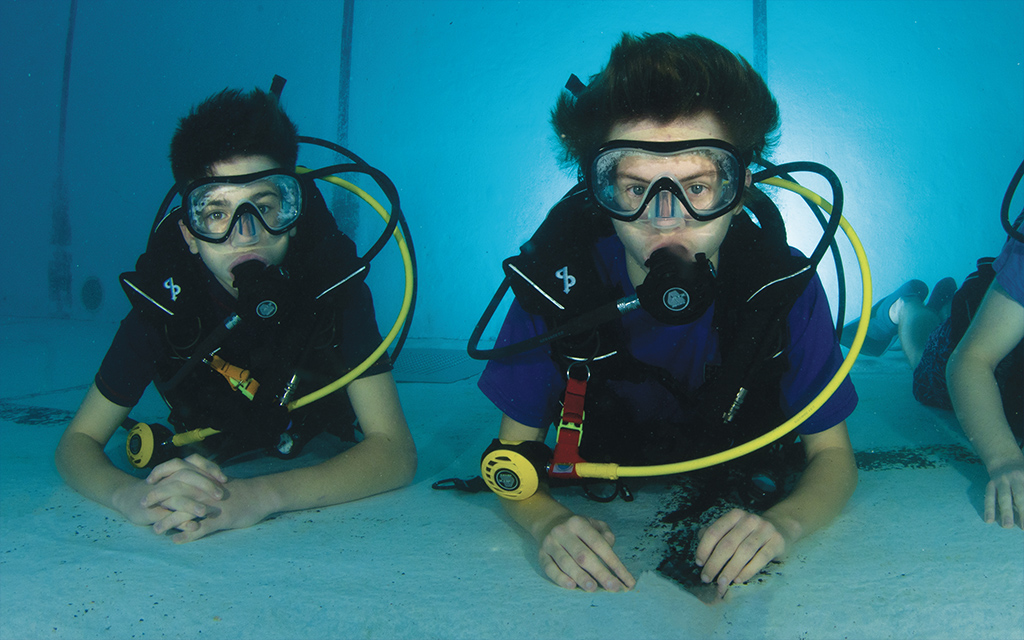
Photo credits: Simon Rogerson
Can BSAC courses be taught in a school environment? SCUBA meets teacher/ instructor James Hickman, who has been doing just that at Reading Blue Coat School.
SCUBA: Tell us when and how you set up the dive training system at your school
James Hickman: I joined Reading Blue Coat School in January 2022. In a previous school I ran an annual overseas scuba diving expedition for students during the Easter holiday. This involved an external dive operator coming in to do the teaching ahead of the expedition. When I joined Blue Coat, the school was very keen to do the same, so I ran an expedition to Malta in 2023. Since then, the school has developed its activities programme which now includes adventurous activities such as climbing and sailing. I proposed the idea of a BSAC branch to run the training in school and involve more staff and students in all aspects that go with a club environment, and the Reading Blue Coat Sub-Aqua Club has been up and running ever since.
SCUBA: Tell us about your own diving background
JH: My journey into scuba diving began with learning to snorkel, as I was too young at the time to learn to dive. I was fortunate enough to start scuba diving when I was 14, which at the time was the youngest you could commence Ocean Diver training. Some of my earliest open water dives were in the Sound of Mull which just captivated me, particularly the scale of some of the wrecks, as well as the proliferation of marine life. At university, I was President of the sub-aqua club, and the summer after graduating, I spent a season as a dive guide and instructor in Croatia. I love the UK diving scene and over the years have remained an active member of my local diving club. I am lucky in that my family are also very keen divers. After becoming an Advanced Instructor in 2021, I completed the Instructor Trainer Development Course and I really enjoy volunteering as an Instructor Trainer on national events.
SCUBA: Tell us about your students and where they are trained
JH: Last academic year, three students gained their Ocean Diver qualification, and two students achieved Sports Diver. This year we have 11 Ocean Diver trainees, so are growing in number, which is great!
We run the theory lectures in school, and conduct the sheltered water lessons in the school pool. Our open water training is done in Vobster Quay. John Hudson, our Regional Coach, has been really supportive with our open water training. We also couldn’t run the open water training without the amazing support of volunteer instructors from outside our branch.
At the moment all of the students are male, but we are in the process of going fully co-educational as a school. Students are aged between 11 and 18, but we only accept students from aged 12 (Year 8) to train as Ocean Divers.
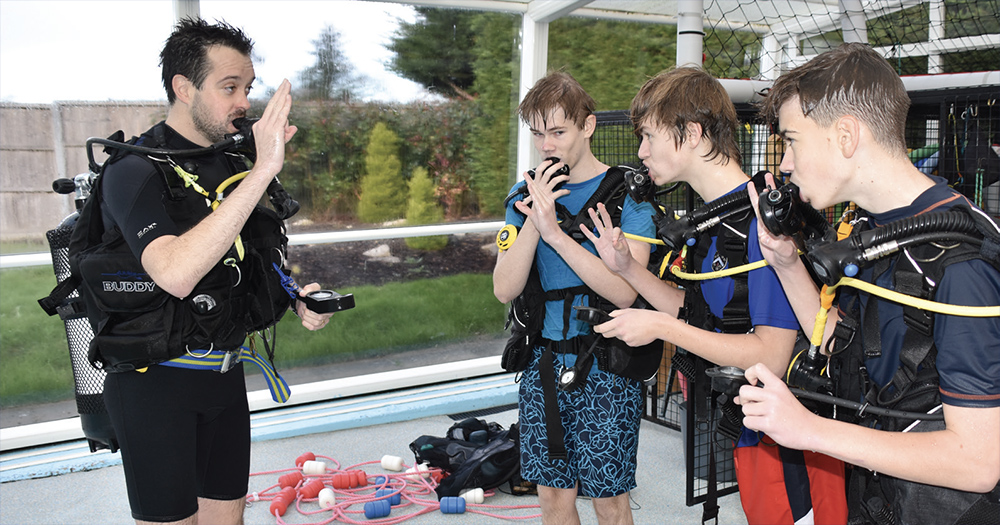
Buddy check in progress
SCUBA: Was it easy to persuade the school to adapt a diving programme?
JH: The school have been very supportive with setting up the club, as it is such a unique offering for our pupils. Having enough instructors is a perennial challenge - because we are a school, we have a higher turnover of members than most branches. In the early days, I split the trainees into two groups and did alternate weeks of pool training, with everyone in the classroom to deliver the theory lectures. In January, we ran an Instructor Foundation Course for a staff member and a student to become Assistant Instructors. BSAC HQ has been a great source of help with this. With more Assistant Instructors, this should make training easier.
SCUBA: How have the pupils responded to dive instruction?
JH: The students really enjoy the process of learning to dive. They have loads of questions about the kit and how it works, as well as asking about tales from the deep. The hardest part is getting them to slow down underwater and take in their surroundings on a dive, rather than racing off! The highlight is definitely seeing students you have taught to dive diving safely and confidently in open water, once their training is complete.
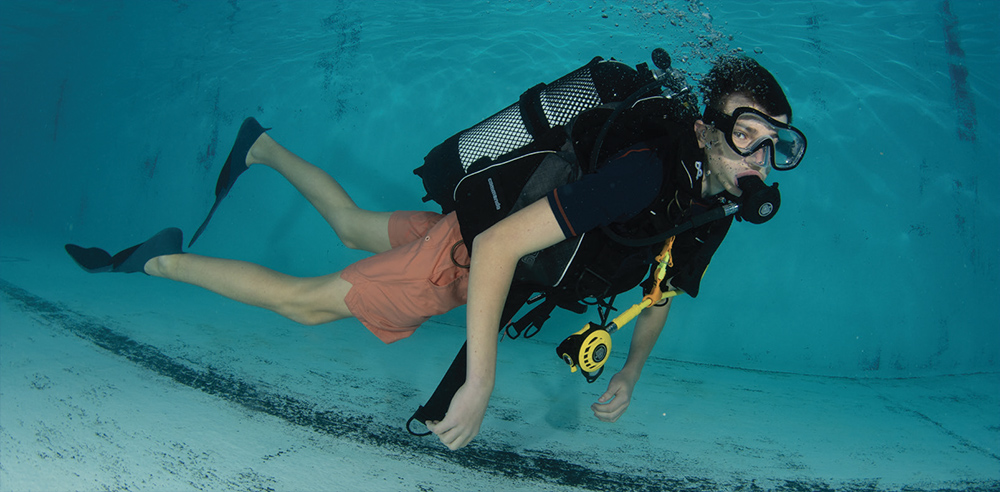
Theo finning in the pool
SCUBA: What kit does the school own?
JH: We have four sets of BCDs and regulators, eight 12-litre cylinders and a selection of weights and weight belts. We also have a range of shoe fins, masks and snorkels. The membership fee covers the maintenance of this kit. I dream of a club RIB, but I think we will have to settle for shore diving for the near future.
We usually rent our open water kit, because getting kit, particularly suits, to fit students of a wide age range is quite difficult. We are looking to grow our range of kit, as this is one way to keep the cost of trips and training down. We don’t have our own compressor, so Divecrew in Crowthorne handles our cylinder fills.
SCUBA: Are there any special considerations for dive instruction in a school setting?
JH: Not in school, as staff are all DBS checked as part of our job. As staff we need to supervise volunteers who we bring in from outside the staff body. The logistics of a school diving trip can sometimes be a bit of a challenge, but the reward is definitely worth the hassle.
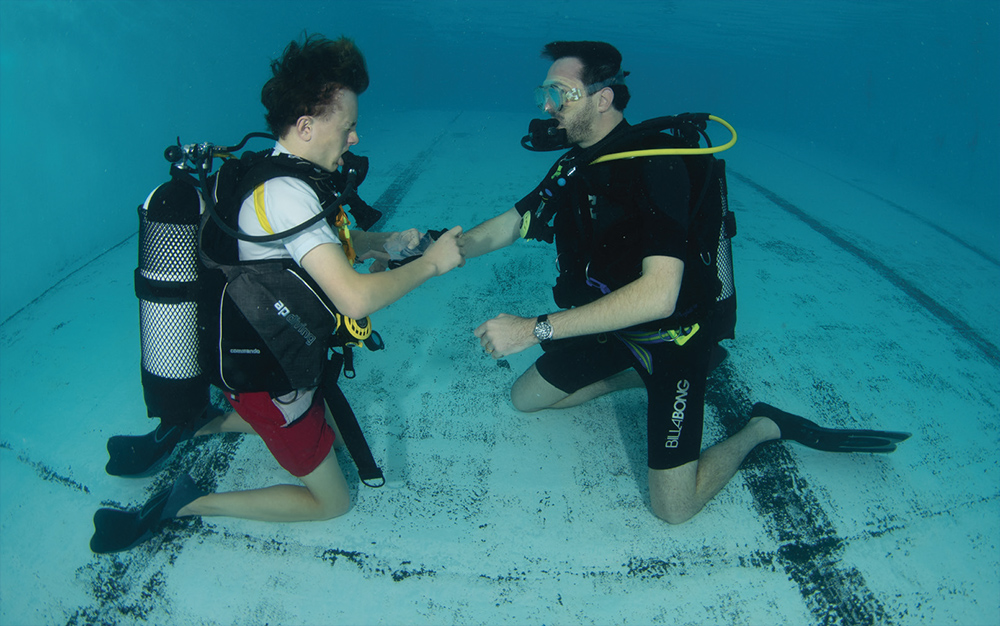
Rufus practises mask clearing
SCUBA: Any dive trips planned?
JH: Similar to university clubs, we are constrained by the academic year, which is mostly in the less favourable months for UK diving! Despite this challenge, this year, we plan to finish our open water training in Vobster Quay in spring; we have an expedition to Cyprus over Easter, and are also looking to dive in Swanage at the end of summer.
Article ‘Teenage Kicks’ by Simon Rogerson first published in SCUBA magazine, Issue 153 March 2025.
Ready to start your scuba adventure? Sign up for eLearning!
You can get started straight away with the theory knowledge element of BSAC's entry-level courses, Discovery Diver and Ocean Diver, and work at your own pace using the BSAC eLearning system.

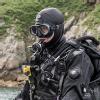 Author: Simon Rogerson | Posted 16 Apr 2025
Author: Simon Rogerson | Posted 16 Apr 2025



